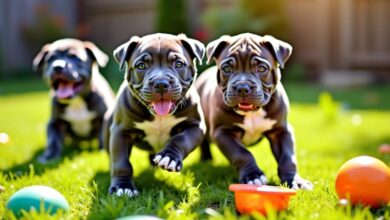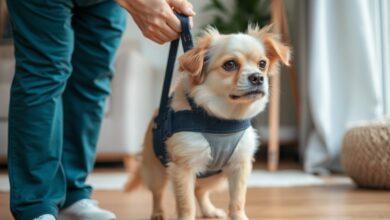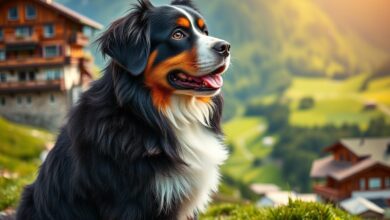Cane Corso Best Food – Complete Nutrition Guide
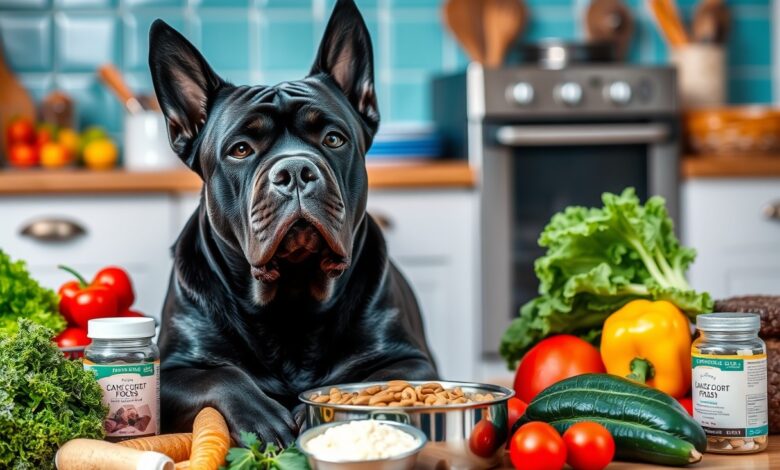
Cane Corsos are powerful and devoted companions, but proper nutrition is vital for their health and vitality. As a responsible owner, you must ensure your dog receives a well-balanced diet tailored to their specific needs, including protein for muscle development and healthy fats for skin and coat. In this guide, you will discover the best food options and tips for feeding your Cane Corso, along with potential health risks tied to poor nutrition. For additional insights, check out the community discussion on Best food for a Cane Corso? : r/CaneCorso.
Key Takeaways:
- High-Quality Protein: Ensure your Cane Corso’s diet includes high-quality proteins to support muscle development and overall health.
- Balanced Nutrition: Look for a well-balanced formula containing the right mix of carbohydrates, fats, vitamins, and minerals tailored for large breed dogs.
- Watch for Allergens: Be mindful of potential food allergies; select recipes with limited ingredients or specific protein sources if your dog shows sensitivities.
Types of Cane Corso Food
For your Cane Corso, selecting the right type of food is crucial for their health and well-being. Here are the primary types of Cane Corso food to consider:
| Dry Kibble | A convenient and popular choice for daily feeding. |
| Wet/Canned Food | Moisture-rich food that many dogs enjoy for its taste. |
| Raw Diet Options | Provision of raw meats and vegetables for a natural diet. |
| Home-Cooked Meals | Ability to control ingredients and cater to specific needs. |
| Treats and Supplements | Enhancements to your dog’s diet for health support and training. |
After considering all options, you can determine which type best fits your Cane Corso’s needs.
Dry Kibble
One of the most common choices for feeding your Cane Corso is dry kibble. This option provides a balanced diet and is designed to meet the nutritional requirements specific to large breeds. Dry kibble also helps maintain dental health by reducing plaque buildup.
Wet/Canned Food
You may find that your Cane Corso enjoys the aroma and texture of wet or canned food. It typically contains higher moisture content, which helps keep your dog hydrated, especially if they haven’t been drinking enough water. This can often be mixed with dry kibble for a more varied diet.
Understanding the benefits of wet/canned food can enhance your Cane Corso’s dinning experience. These foods are often rich in protein, fats, and important nutrients, which can contribute to your dog’s overall health. Be cautious, however, to select high-quality brands devoid of fillers and artificial preservatives.
Raw Diet Options
Food enthusiasts may consider raw diet options for their Cane Corso, emphasizing the idea of a natural diet reflective of their ancestral eating habits. This option often includes raw meats, bones, vegetables, and organs to provide a complete diet.
Plus, a raw diet can offer various health benefits, such as improved coat quality, increased energy levels, and better digestion. However, it’s crucial to follow a well-balanced raw feeding plan to avoid any nutritional deficiencies and to ensure your dog is not exposed to harmful bacteria. Always consult with your veterinarian before making significant changes to your Cane Corso’s diet.
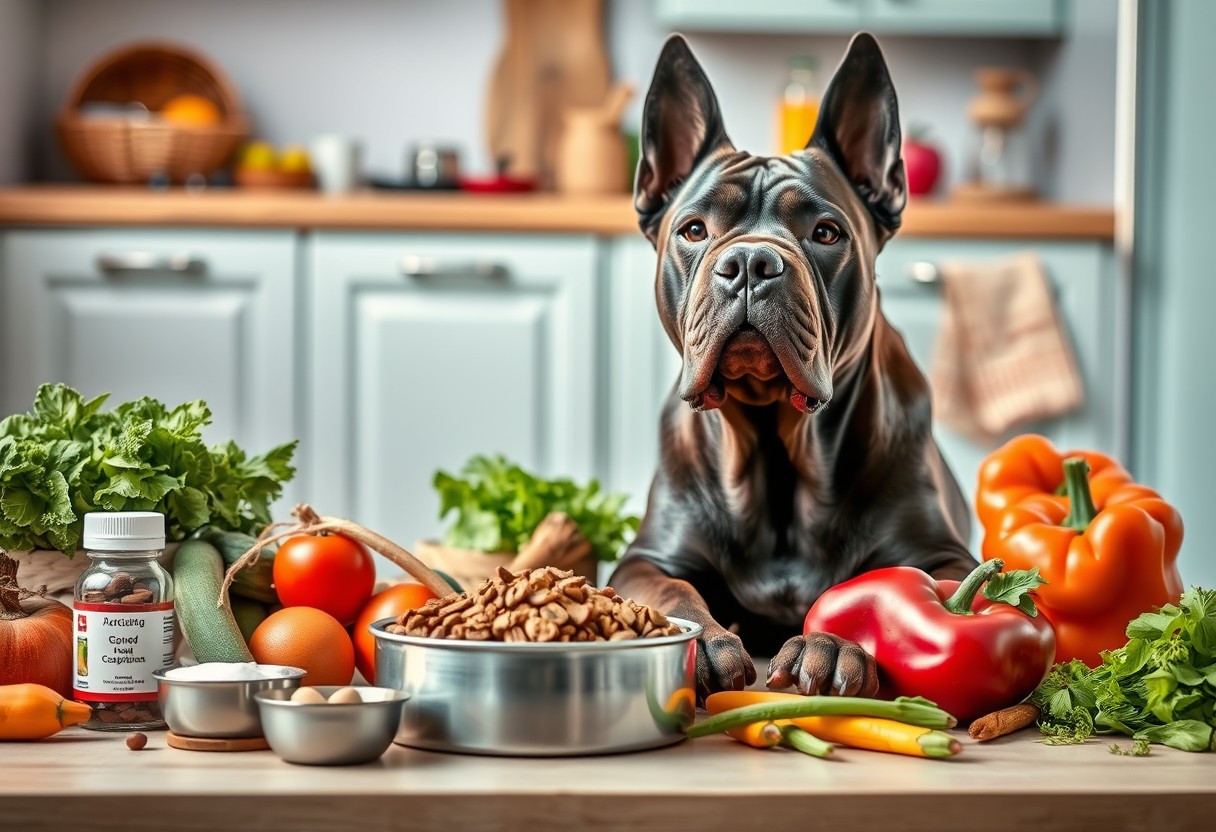
Factors to Consider in Choosing Cane Corso Food
Any responsible Cane Corso owner knows that selecting the right food is important for their dog’s health and well-being. Here are some key factors to consider:
- Age: Puppies have different nutritional needs than adults.
- Size: Larger breeds require specific diets to support their growth.
- Activity Level: Active dogs need more calories and nutrients.
- Health Conditions: Some conditions might require specialized diets.
Thou must consider these elements carefully to ensure your Cane Corso thrives.
Age and Size
An important consideration when choosing food for your Cane Corso is their age and size. Puppies, adults, and seniors have different dietary needs. Puppies require higher levels of protein and fat to support their rapid growth, while adult Cane Corsos benefit from a balanced diet that maintains their healthy weight. Additionally, due to their size, large breed formulas are important to prevent hip and joint issues.
Activity Level
For your Cane Corso, understanding their activity level is crucial in selecting the appropriate food. The amount of exercise they get significantly impacts their caloric and nutritional needs.
This breed is known for its strength and agility, so a highly active Cane Corso will require a diet rich in >calories and nutrients to fuel their vigorous lifestyle. If your dog participates in regular exercise, such as walks, playtime, or training, opt for a food designed for high-energy dogs. This ensures they receive adequate proteins for muscle development and carbohydrates for sustained energy throughout the day.
Health Conditions
For some Cane Corsos, certain health conditions may impact their dietary requirements. It’s important to choose a food that addresses these issues.
Health considerations such as hip dysplasia, allergies, or obesity can dictate your dog’s nutritional needs. For example, if your Cane Corso suffers from hip dysplasia, a diet rich in omega fatty acids can help maintain joint health. On the other hand, if they are prone to allergies, it may be necessary to select grain-free or limited ingredient diets to avoid potential irritants. Always consult with your veterinarian to determine the best dietary approach tailored to your Cane Corso’s specific health conditions.

Nutritional Components for Optimal Health
Your Cane Corso requires a well-balanced diet to maintain optimal health and energy levels. It is imperative to consider various nutritional components that contribute to their overall well-being, including proper How often should a Cane Corso puppy eat?, protein, fats, vitamins, and minerals. Understanding these elements will help you provide the best nutrition for your loyal companion.
Protein Requirements
For your Cane Corso, a high-protein diet is vital for muscle development and overall health. They thrive on protein sources like meat, fish, and eggs, which should comprise 20-30% of their daily caloric intake.
Fats and Fatty Acids
If you want your Cane Corso to maintain healthy skin and a shiny coat, include quality fats and fatty acids in their diet. A balanced amount of omega-3 and omega-6 fatty acids supports immune function and assists in brain development.
Protein forms the backbone of your Cane Corso’s diet, helping them to build and maintain strong muscles. Essential fatty acids ensure that they have the energy to participate in daily activities and support cognitive function. Sourcing quality animal fats from fish oil or flaxseed will help achieve a well-rounded fat profile.
Vitamins and Minerals
Components such as vitamins and minerals are crucial for your Cane Corso’s health. These nutrients help regulate metabolic processes and ensure proper bone growth, immune function, and overall vitality.
Health issues can arise from deficiencies in vitamins and minerals, such as osteoarthritis and immune dysfunction. Providing a balanced diet rich in calcium, phosphorus, and vitamins A, D, and E is imperative for the well-being of your Cane Corso. Always consult with a veterinarian to tailor a diet that meets your pet’s individual needs.
Tips for Transitioning Food
Despite the excitement of introducing new food to your Cane Corso, transitioning their diet requires careful planning. Follow these tips for a smooth change:
- Start slowly with a gradual introduction
- Observe any allergies that may arise
- Ensure hydration throughout the process
Perceiving your dog’s reactions during this time can make a significant difference.
Gradual Introduction
Any change in your Cane Corso’s diet should be approached with a gradual introduction to avoid digestive issues. Start by mixing a small portion of the new food with their current diet, increasing the new food gradually over a week or two.
Monitoring for Allergies
Food allergies can occur in any breed, including your Cane Corso. It’s vital to pay close attention after introducing new food to identify any signs of allergies, such as itching, gastrointestinal disturbances, or swelling.
Monitoring your dog closely during the transition is critical. Assess their behavior and physical condition at every stage. If you notice any alarming changes, revert to their previous diet and consult your veterinarian for advice. Remember that early detection of potential allergies can prevent serious health issues.
Ensuring Hydration
There’s a significant connection between your Cane Corso’s diet and their hydration. Always provide fresh water, especially when changing their food, to help their digestive system adjust and stay hydrated.
The importance of hydration cannot be overstated, particularly during dietary changes. Ensure your Cane Corso drinks plenty of water, as adequate hydration supports their overall health and aids in the digestion of new food. Dehydration can lead to serious complications, so keep a close eye on their water intake during this transition.
Step-by-Step Guide to Feeding
Unlike many other breeds, Cane Corsos require a well-structured feeding regimen to maintain their health and vitality. In this guide, you’ll learn how to effectively provide balanced nutrition for your dog, covering everything from portion sizes to treats. Pay close attention to your dog’s specific needs to ensure they thrive.
| Feeding Aspect | Details |
|---|---|
| Portion Sizes | Calculate based on age, weight, and energy level. |
| Feeding Schedule | Establish regular meal times for consistency. |
| Treats and Snacks | Use sparingly to avoid overfeeding. |
Portion Sizes
Sizes are critical when feeding your Cane Corso. Generally, adult Corsos need about 4 to 6 cups of high-quality food daily, divided into two meals. Puppies may require a higher caloric intake, adjusted for their size and activity levels. Accurate portion sizes help in preventing obesity and maintaining optimal health.
Feeding Schedule
StepbyStep, it is vital to establish a consistent feeding schedule for your Cane Corso. Ideally, you should feed your dog twice a day at the same time. This regularity not only helps with digestion, but also promotes a sense of security. Make sure you’re monitoring their cravings closely as this may shift with age and activity levels.
It is crucial to avoid abrupt changes in feeding times; consistency promotes better digestive health and behavior. Keep track of your dog’s response to various schedules and adjust accordingly. Regular meal times will also improve training and reduce anxiety related to food availability.
Treats and Snacks
Clearly, treats should be used wisely. Always opt for high-quality, low-calorie rewards to avoid excess weight gain. Treats can be a great motivational tool during training, but moderation is key. Aim for treats to make up no more than 10% of your dog’s daily caloric intake.
For instance, you can select options like small pieces of carrot or apple as healthier snacks instead of high-fat treats. Be mindful of, some human foods can be harmful to your dog, so always research what is safe before sharing. Prioritize their health by focusing on nutritious treats that contribute positively to their overall diet.
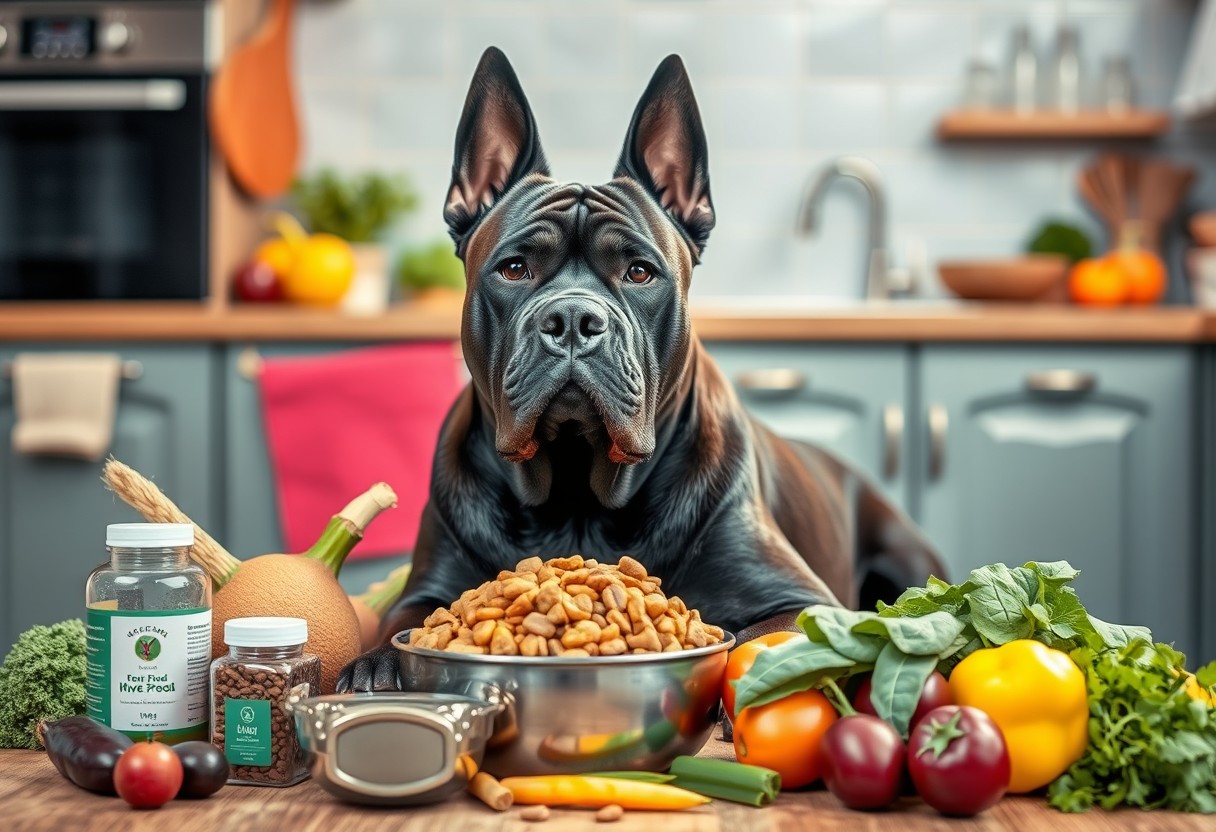
Pros and Cons of Different Diets
To choose the best diet for your Cane Corso, it’s vital to evaluate the advantages and disadvantages of each option. Below is a simplified comparison to help you decide the most appropriate feeding strategy:
| Diet Type | Pros and Cons |
|---|---|
| Commercial Kibble | Convenient; balanced nutrients. May contain fillers and preservatives. |
| Homemade Diet | Fully customizable; control over ingredients. Time-consuming and requires careful planning. |
| Raw Diet | Natural ingredients; promotes dental health. Risk of bacterial contamination. Learn more about Raw Feeding for Cane Corsos: A Complete Nutritional Guide. |
| Grain-Free Diet | May reduce allergies and improve digestion. Can be high in protein/fat; monitor for health risks. |
| High-Protein Diet | Supports muscle health. Not suitable for all dogs; consult your vet. |
Commercial vs. Homemade Diet
To decide between a commercial and homemade diet, consider your lifestyle and the nutritional needs of your Cane Corso. Commercial food offers convenience and usually has a balanced nutrient profile, whereas a homemade diet allows for customization and control over ingredients. However, homemade diets require you to ensure they meet your dog’s specific nutritional needs.
Grain-Free Options
One common trend among pet owners today is choosing grain-free options for their Cane Corsos. These diets can help alleviate sensitivities and allergies. However, it’s crucial to consult with your veterinarian to ensure a balanced intake of necessary nutrients.
Options for grain-free diets range from high-quality kibble to homemade meals. While they can be beneficial for dogs with grain allergies, it’s important to watch for potential health concerns such as nutritional deficiencies or increased risks of heart disease. Always ensure your dog gets a balanced diet with adequate protein, fats, and vitamins.
Raw Diet Considerations
Pros of a raw diet include better oral health, shinier coats, and higher energy levels. However, it’s vital to implement safety measures to avoid contamination, as feeding raw meat carries the risk of bacterial infections like Salmonella or E. coli. Moreover, it may not meet all nutritional requirements if not properly planned.
A raw diet can be highly rewarding for dogs, but also needs careful consideration. Make sure that your diet is balanced, carefully measuring protein, fat, along with vital vitamins and minerals. Proper handling and preparation of raw ingredients are key to your Cane Corso’s health, as is regular consultation with your veterinarian.
Conclusion
Considering all points, selecting the best food for your Cane Corso is crucial for their overall health and vitality. By focusing on high-quality protein, crucial fats, and appropriate vitamins and minerals, you can ensure your dog receives complete nutrition tailored to their unique needs. Always consult with your veterinarian to tailor your dog’s diet for their specific age, weight, and activity level. With the right dietary choices, you can promote a long, healthy life for your beloved Cane Corso.
Q: What type of food is best for a Cane Corso?
A: The best food for a Cane Corso typically includes high-quality protein sources, healthy fats, and important vitamins and minerals. Look for dog food that lists meat (like chicken, beef, or lamb) as the first ingredient. Additionally, options that include complex carbohydrates (such as brown rice or sweet potatoes) are beneficial for energy. It’s crucial to choose a dog food formulated for large breeds, as it will cater to their unique nutritional needs and support their bone and joint health.
Q: How much should I feed my Cane Corso daily?
A: The daily food intake for a Cane Corso can vary based on their age, weight, and activity level, but generally, adult Cane Corsos require about 4 to 6 cups of high-quality dry dog food per day, divided into two meals. Puppy Cane Corsos may need more frequent feeding (3-4 times a day) and larger quantities as they grow. It’s important to monitor your dog’s weight and adjust their food intake accordingly to maintain a healthy weight, and always consult with your veterinarian for tailored feeding guidelines.
Q: Are there any specific ingredients I should avoid in Cane Corso food?
A: Yes, when selecting food for your Cane Corso, it’s advisable to avoid ingredients that may be harmful or lead to health issues. Look out for dog foods that contain artificial preservatives, colors, or flavors. Additionally, steer clear of by-products, fillers (like corn, soy, and wheat), and excessive amounts of grains, which can be hard for some dogs to digest. Always check labels for potential allergens if your Cane Corso has known sensitivities, and consult with your veterinarian if you have concerns about specific ingredients.


